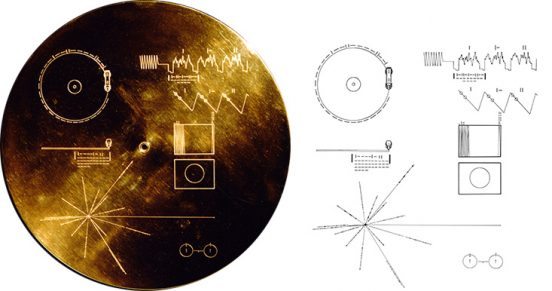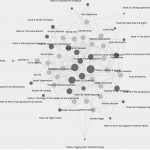Dr Smith in his article on digitizing content makes some excellent points that I feel have come up in my own life in regard to digital technologies and their temporality. He says “Much is gained by digitizing, but permanence and authenticity, at this juncture of technological development, are not among those gains.” (1999) I have floppy disks (not the true old floppys but those that South African’s call stiffies, that are smaller and made of hard plastic) with records of some of the work I did in elementary school. These disks are almost impossible to read today but at the time it seemed like such an excellent means of storing data seemingly forever. The changes in storage technology not to mention the changes in the formatting on the software end means that digitization is not a good means of keeping information for a long period of time. This excellent podcast, which I have mentioned before in my posts, talks about the fragility of digital storage (start @ 17 min). James Harkin says “everything that we use now is going to become obsolete, in 100 years time no one will be able to read any of it, not like a book” (Harkin et al, 2020) and mentions as an example this story about the BBC. In 1986 they made a digital doomsday book on an acorn computer with a video disk player, 13 years later it was unreadable and as a result a team of researchers spent 3 years working out how to access the information on the disk.
This example may sound extreme but ask anyone who was alive through the 80s and 90s how much of their old digital memories have been lost to changes in technology. You would be hard pressed to find even a VHS player in most homes today. It is true that analogue technology is much longer lasting and that is why it is nice to know that the technology NASA sent out in the 70s was of an analogue variety. It is likely that they did that because the digital technology didn’t really exist but in the end it will be longer lasting and easier to decode were an alien life-form to encounter it.
In regards to the Golden Record Project I have some strong opinions on this particular human endeavour. If the purpose of the record is to communicate with potential alien life, then I do not believe the record they created would be a very useful tool. Wouldn’t you want to give them a single type of information so that they could begin to follow the clues in the coding system and potentially understand meaning, rather than give them a huge variety of kinds of sounds, languages, noises etc. with no context? If, however, the record is meant to be a kind of “brag” to an alien about how diverse we are as a planet then they have done a good job. The interviewee, Timothy Ferris, acknowledges that the record sent out into space may never reach the “ears” of another form of life and that it is possible that “This record might only be for us.” (Taylor, 2019) If however it does reach another form of life, he says that the message is meant to say, “We are here and we are listening”. If that is the case, I would suggest that they did an adequate job. I would have maybe included sounds of children playing or more animal sounds, like a lion’s roar or the sounds of songbirds. My main objection is, if I put myself in the place of an alien, who knows nothing about our world, I would find it difficult to decipher some meaning from the various sounds we have proposed. Assuming I am able to even differential frequencies in such a way I would not know which parts of the record contain actual meaning (words, whale sounds, mathematical sonography of the planets etc.) and which parts contain “beautiful music” (pan-flutes, pianos and violins). I might try to code the music of the pan-flutes to discover a code hidden in the song and then try to interpret the message, in the same way as I might do to the humain voices. The difference is there is not inherent meaning in the sounds of the pan flute, there is simply “music”. That being said it is an extraordinary achievement and the creators indeed used their imagination to come up with what they thought was the most diverse and representative sounds of humanity. Timothy Ferris says “Humanity, however limited or small or primitive we had the imagination and intellect to think about scales of time and space far beyond our own”. (Taylor, 2019)
I find the task of selecting my top 10 songs difficult to do, mostly because I do not really like music. I find most of the tracks on this record deeply uncomfortable to listen to. If it were truly up to me I would not include any music on a communication device meant for alien intelligence. If, however, I had to I would take out all music that does not have human voices. That would leave the following songs.
- Java, court gamelan, “Kinds of Flowers,” recorded by Robert Brown. 4:43
- Mexico, “El Cascabel,” performed by Lorenzo Barcelata and the Mariachi México. 3:14
- “Johnny B. Goode,” written and performed by Chuck Berry. 2:38
- New Guinea, men’s house song, recorded by Robert MacLennan. 1:20
- Mozart, The Magic Flute, Queen of the Night aria, no. 14. Edda Moser, soprano. Bavarian State Opera, Munich, Wolfgang Sawallisch, conductor. 2:55
- Bulgaria, “Izlel je Delyo Hagdutin,” sung by Valya Balkanska. 4:59
- Navajo Indians, Night Chant, recorded by Willard Rhodes. 0:57
- China, ch’in, “Flowing Streams,” performed by Kuan P’ing-hu. 7:37
- India, raga, “Jaat Kahan Ho,” sung by Surshri Kesar Bai Kerkar. 3:30
- “Dark Was the Night,” written and performed by Blind Willie Johnson. 3:15
References:
Smith, A. (1999). Why digitize? Retrieved June 15, 2019, from Council on Library and Information Resources website: https://www.clir.org/pubs/reports/pub80-smith/pub80-2/
Harkin, J., Murray, A. H., Ptaszynski, A., & Schreiber, D. (Hosts). (2020, Aug 27). No such thing as a delicious emergency salad. [Audio podcast episode]. In No Such Thing as a Fish. Quite Interesting. https://www.nosuchthingasafish.com/
Taylor, D. (Host). (2019, Apr 22). Voyager Golden Record [Audio podcast episode]. In Twenty Thousand Hertz. Defacto Sound. https://www.20k.org/






